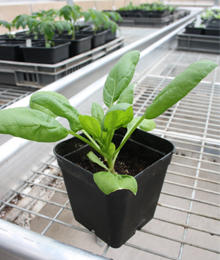An interview with Dr Nicola Holden
December 2019
Dr Nicola Holden is a Molecular Bacteriologist at The James Hutton Institute, UK and a member of the Microbiology Society. In this interview she tells us more about her research on the interactions between bacteria and their plant hosts, how research has expanded since she started her career and why microbiology matters.

Tell us more about your research
I trained as a Molecular Microbiologist under the guidance of Maurice Gallagher (Edinburgh), getting to grips with how Salmonella enterica adapts to low temperatures in the fridge. This was an excellent introduction to bacterial adaptation to sub-optimal conditions and has had a lasting impression on my experimental work to take into account the bacterial physiological status.
I’m happy to say that I continue to work with S. enterica, as well as the related enteric human-pathogens Escherichia coli and Klebsiella pneumoniae, in the context of plant hosts. This is important for food safety since plant products are often eaten raw or are minimally processed, providing an excellent route of transmission for these pathogens into the food chain.
This area has opened whole new aspects of environmental microbiology to me, and I’ve come to really appreciate the complexity of microbial interactions in different environments. Thus, I’ve learnt the importance of having a systems approach rather than considering just the single aspect of the complex interactions. Taking this view, we’ve found that the human pathogenic enteric bacteria behave on plants in a similar opportunistic manner to some plant pathogens. This is down to them to having sufficient metabolic flexibility and physiological resilience to take advantage of any favourable situation.
How do you think research has expanded over the last few years?
One of the most striking recent technological developments is in deep sequencing, allowing a far richer view of microbial communities than was imagined when I started out. It puts microbiology is the midst of the next ‘revolution’: just as PCR opened new molecular aspects, our appreciation of microbial communities (microbiomes) has driven completely novel areas of research. As such, it is possible to have a far better understanding of our favourite microbe, be it friend or foe, by effectively being able to lift the curtain on the whole microbiome background, and so put a far more realistic context on the situation.
Why does microbiology matter?
Microbiology has always been close to my heart as a means to improve food safety and support human health, but I’m especially delighted to see how it has its impact has widened far beyond the bad news stories of infection, to provide a real sense of wonder of the natural world to the layman as much as to the academic.


